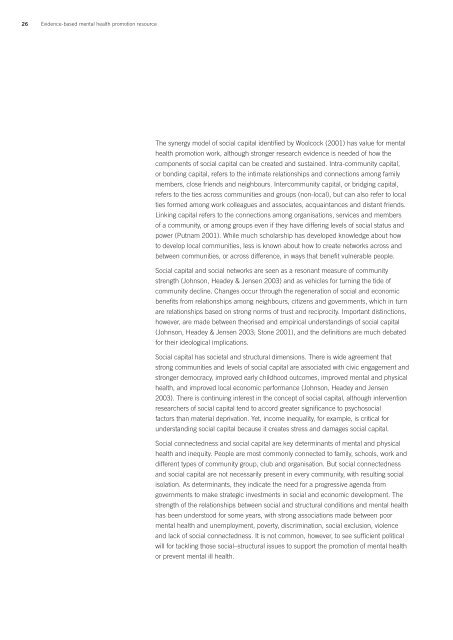Evidence-based mental health promotion resource - health.vic.gov.au
Evidence-based mental health promotion resource - health.vic.gov.au
Evidence-based mental health promotion resource - health.vic.gov.au
Create successful ePaper yourself
Turn your PDF publications into a flip-book with our unique Google optimized e-Paper software.
26 <strong>Evidence</strong>-<strong>based</strong> <strong>mental</strong> <strong>health</strong> <strong>promotion</strong> <strong>resource</strong>The synergy model of social capital identified by Woolcock (2001) has value for <strong>mental</strong><strong>health</strong> <strong>promotion</strong> work, although stronger research evidence is needed of how thecomponents of social capital can be created and sustained. Intra-community capital,or bonding capital, refers to the intimate relationships and connections among familymembers, close friends and neighbours. Intercommunity capital, or bridging capital,refers to the ties across communities and groups (non-local), but can also refer to localties formed among work colleagues and associates, acquaintances and distant friends.Linking capital refers to the connections among organisations, ser<strong>vic</strong>es and membersof a community, or among groups even if they have differing levels of social status andpower (Putnam 2001). While much scholarship has developed knowledge about howto develop local communities, less is known about how to create networks across andbetween communities, or across difference, in ways that benefit vulnerable people.Social capital and social networks are seen as a resonant measure of communitystrength (Johnson, Headey & Jensen 2003) and as vehicles for turning the tide ofcommunity decline. Changes occur through the regeneration of social and economicbenefits from relationships among neighbours, citizens and <strong>gov</strong>ernments, which in turnare relationships <strong>based</strong> on strong norms of trust and reciprocity. Important distinctions,however, are made between theorised and empirical understandings of social capital(Johnson, Headey & Jensen 2003; Stone 2001), and the definitions are much debatedfor their ideological implications.Social capital has societal and structural dimensions. There is wide agreement thatstrong communities and levels of social capital are associated with ci<strong>vic</strong> engagement andstronger democracy, improved early childhood outcomes, improved <strong>mental</strong> and physical<strong>health</strong>, and improved local economic performance (Johnson, Headey and Jensen2003). There is continuing interest in the concept of social capital, although interventionresearchers of social capital tend to accord greater significance to psychosocialfactors than material deprivation. Yet, income inequality, for example, is critical forunderstanding social capital bec<strong>au</strong>se it creates stress and damages social capital.Social connectedness and social capital are key determinants of <strong>mental</strong> and physical<strong>health</strong> and inequity. People are most commonly connected to family, schools, work anddifferent types of community group, club and organisation. But social connectednessand social capital are not necessarily present in every community, with resulting socialisolation. As determinants, they indicate the need for a progressive agenda from<strong>gov</strong>ernments to make strategic investments in social and economic development. Thestrength of the relationships between social and structural conditions and <strong>mental</strong> <strong>health</strong>has been understood for some years, with strong associations made between poor<strong>mental</strong> <strong>health</strong> and unemployment, poverty, discrimination, social exclusion, violenceand lack of social connectedness. It is not common, however, to see sufficient politicalwill for tackling those social–structural issues to support the <strong>promotion</strong> of <strong>mental</strong> <strong>health</strong>or prevent <strong>mental</strong> ill <strong>health</strong>.



